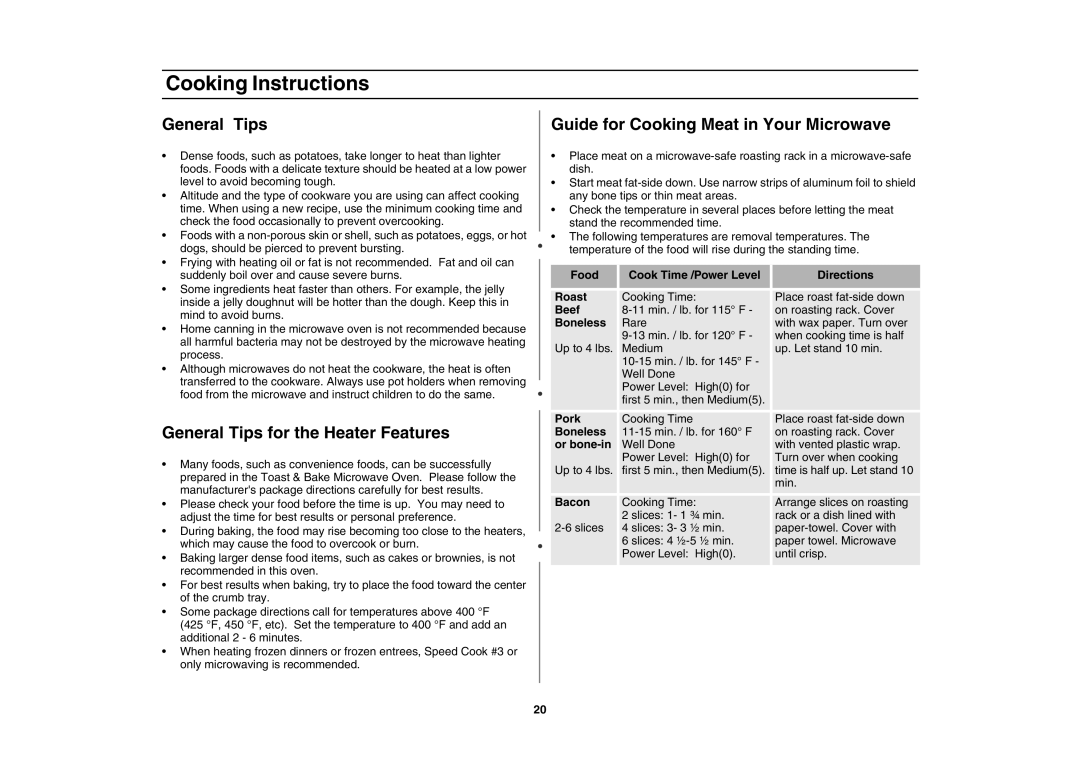
Cooking Instructions
General Tips
•Dense foods, such as potatoes, take longer to heat than lighter foods. Foods with a delicate texture should be heated at a low power level to avoid becoming tough.
•Altitude and the type of cookware you are using can affect cooking time. When using a new recipe, use the minimum cooking time and check the food occasionally to prevent overcooking.
•Foods with a
•Frying with heating oil or fat is not recommended. Fat and oil can suddenly boil over and cause severe burns.
•Some ingredients heat faster than others. For example, the jelly inside a jelly doughnut will be hotter than the dough. Keep this in mind to avoid burns.
•Home canning in the microwave oven is not recommended because all harmful bacteria may not be destroyed by the microwave heating process.
•Although microwaves do not heat the cookware, the heat is often transferred to the cookware. Always use pot holders when removing food from the microwave and instruct children to do the same.
General Tips for the Heater Features
•Many foods, such as convenience foods, can be successfully prepared in the Toast & Bake Microwave Oven. Please follow the manufacturer's package directions carefully for best results.
•Please check your food before the time is up. You may need to adjust the time for best results or personal preference.
•During baking, the food may rise becoming too close to the heaters, which may cause the food to overcook or burn.
•Baking larger dense food items, such as cakes or brownies, is not recommended in this oven.
•For best results when baking, try to place the food toward the center of the crumb tray.
•Some package directions call for temperatures above 400 °F
(425 °F, 450 °F, etc). Set the temperature to 400 °F and add an additional 2 - 6 minutes.
•When heating frozen dinners or frozen entrees, Speed Cook #3 or only microwaving is recommended.
Guide for Cooking Meat in Your Microwave
•Place meat on a
•Start meat
•Check the temperature in several places before letting the meat stand the recommended time.
•The following temperatures are removal temperatures. The
temperature of the food will rise during the standing time.
Food | Cook Time /Power Level | Directions |
|
|
|
Roast | Cooking Time: | Place roast |
Beef | on roasting rack. Cover | |
Boneless | Rare | with wax paper. Turn over |
Up to 4 lbs. | when cooking time is half | |
Medium | up. Let stand 10 min. | |
|
| |
| Well Done |
|
| Power Level: High(0) for |
|
| first 5 min., then Medium(5). |
|
Pork | Cooking Time | Place roast |
Boneless | on roasting rack. Cover | |
or | Well Done | with vented plastic wrap. |
| Power Level: High(0) for | Turn over when cooking |
Up to 4 lbs. | first 5 min., then Medium(5). | time is half up. Let stand 10 |
|
| min. |
Bacon | Cooking Time: | Arrange slices on roasting |
| 2 slices: 1- 1 ¾ min. | rack or a dish lined with |
4 slices: 3- 3 ½ min. | ||
| 6 slices: 4 | paper towel. Microwave |
| Power Level: High(0). | until crisp. |
|
|
|
20
